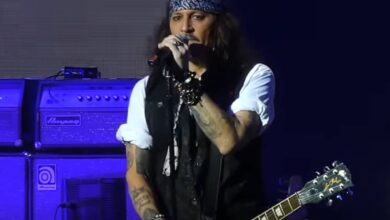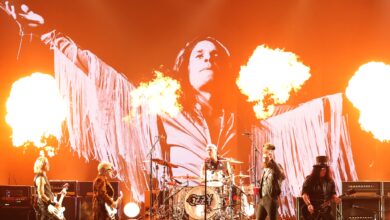Ozzy Osbourne and Rob Halford Unite: “War Pigs” Charity Duet Turns Tribute Into Power and Purpose
The day the duet landed, it didn’t just feel like another Friday drop—it felt like the metal world collectively drew a breath it had been holding for months. Judas Priest unveiled a newly cut version of Black Sabbath’s “War Pigs,” with Rob Halford trading lines with the late Ozzy Osbourne in a posthumous appearance. Released September 26, 2025, the single arrived with a clear, generous purpose: proceeds directed to the Glenn Tipton Parkinson’s Foundation and Cure Parkinson’s. In one stroke it re-centered Ozzy’s unmistakable snarl in the present tense and turned a cornerstone Sabbath anthem into a fundraiser with real-world stakes.
Context made the collaboration especially poignant. Ozzy died in July 2025, a loss that rippled beyond metal’s borders and left friends, fans, and fellow bandleaders reeling. Few were more candid than Rob Halford, who described being inconsolable upon hearing the news, recalling how he collapsed in his hotel room and then carried the grief onto the next night’s stage. When Halford sings those first “Generals gathered in their masses” lines here, you can hear the ache and the gratitude braided together: it’s a salute to a peer, a predecessor, and a friend.
What makes this version special is not just the symbolism—it’s the sheer musical fit. “War Pigs” is a cathedral of a song: a looming riff, a marching tempo, and a lyric sheet that reads like a trial for war profiteers. Drop Halford’s steel-brushed tenor beside Ozzy’s grainier, elastic phrasing and the timbres lock like gears. The result is less a novelty duet than a stylistic handshake between two generations of British metal frontmen who have been swapping festival top lines for decades. The song’s architecture leaves room for both voices to breathe, and they use all of it.
The project had roots in Priest’s own relationship with the song. Earlier in the summer, the band had shared a standalone “War Pigs” cover—an affectionate nod to Sabbath’s blueprint and, implicitly, to Ozzy himself. The positive reaction set a creative fuse. What if there were a way to bring Ozzy into Priest’s version? What if the cover could become a conversation—and a cause? By the time the charity single rolled out, the idea had grown into a fully fledged collaboration that carried both memory and mission.
From the first downbeat, the “Charity Version” feels decisive. The guitars don’t try to reinvent Tony Iommi’s granite slabs; they honor them with a modern mix that presses the riff forward without shaving off its menace. Halford opens with courtroom clarity, leaning into Geezer Butler’s indictment of powers that send others to die. Then Ozzy enters—posthumous but vivid, his vowels bending like old signatures—and the song becomes something new: half memorial, half rallying cry, wholly alive. The call-and-response structure lets each singer play to strengths without crowding the other.
There’s also the Tipton dimension, which deepens the meaning. Glenn Tipton’s long public battle with Parkinson’s has been an open chapter of Judas Priest’s story for years, reshaping touring but never dimming the band’s identity. Hearing that this single directs profits toward his foundation, alongside Cure Parkinson’s, gives every stream and purchase more consequence. It reframes nostalgia as action: fans aren’t just revisiting a classic; they’re underwriting research and care. Few charity releases manage to feel artistically essential and mission-driven at once—this one does.
Halford, for his part, has said the pairing felt both improbable and inevitable. He’d long admired Ozzy’s singular vocal fingerprint—the way even a single word can sound like a grin, a warning, or a dare—and the notion of finally sharing a studio line with him made the veteran frontman sound like a kid again. Hearing him describe the final cut as “colossal” isn’t hype so much as accurate engineering language; on good speakers, the chorus hits like a freight elevator rising.
But the detail that lodges in the throat is how this record functions as a goodbye that refuses to be past tense. Ozzy’s performances were never only about darkness; they were about humor, resilience, and that irrepressible love of a good hook. On “War Pigs,” you hear all of that presented cleanly, without the soft focus of tribute clichés. It’s bracing. It also gives fans something many didn’t expect to receive so soon after July: new sound from the voice they were still mourning.
The release timing carries its own quiet narrative. In a summer defined by memorials and think-pieces about endings, a song about accountability feels almost medicinal. It demands attention without voyeurism. It invites fist-raising without trivializing grief. And crucially, it asks the community to do something measurable—press play, share, buy the download, order the physical—because those actions convert directly into funding for Parkinson’s research. That straight line between emotion and outcome is rare in pop culture, rarer still in legacy-artist collaborations.
Musically, the track keeps faith with Sabbath’s dynamic arc. The verses stalk; the breaks twitch; the tempo shifts like a horse that smells smoke. Halford and Ozzy make different choices about consonants and sustain, but they meet on the long vowels where British metal lives. That’s where the hair-raising happens—on “masses,” on “sorcerers,” on “bodies burning”—the spots where timbre becomes storytelling. If you ever wondered how two iconic frontmen might inhabit the same protest hymn without stepping on each other, this is the field test that passes.
For younger listeners, the single doubles as a crash course in metal lineage. Here are the inventors and the inheritors, on the same track, pointing back to 1970 and forward to whatever comes next for heavy music as a philanthropic engine. For longtime fans, it’s proof of concept: the scene can mourn its legends and still make the present tense count. That’s not an easy balance; plenty of memorial releases stall under the weight of sentiment. This one moves. It snarls. It raises money. It rocks.
The charity component also underscores how the community has learned to organize around its own. Parkinson’s has touched multiple corners of the genre, and Priest’s formalized foundation gives fans a vetted channel to direct their affection. The single becomes a ritual object—repeatable, scalable, evergreen—rather than a one-night telethon. In a landscape of fleeting trends and algorithmic novelty, that durability matters. It means the track can continue to generate research dollars long after headlines roll over.
It’s worth noting how respectful the arrangement is to the original’s moral center. Geezer Butler’s lyrics have always been the sermon; the band is the choir; the singer is the town crier on the steps. The 2025 cut preserves that civic posture. You don’t get ironic detours or maximalist liberties. You get a faithful reading shaped by two voices that know what it means to live inside an idea for half a century. The message clarifies, not calcifies.
If you’re looking for a single behind-the-scenes image to hold onto, take Halford’s memory of being asked whether there might be a way to bring Ozzy into Priest’s version—and his immediate, almost giddy, “This is gonna happen.” That tone—equal parts reverence and determination—colors the whole project. It’s the sound of a scene refusing to treat legacy as a museum exhibit. It’s also the sound of friends making good on a promise to look after one another long after the spotlights dim.
Taken together, “War Pigs (Charity Version)” operates like a three-way pact: between bands, between eras, and between fans and the people whose art shaped them. It’s a pact to keep the music loud, the memories close, and the money flowing where it can help. If you strip away the headlines and the hashtags, what remains is a beautifully executed idea—simple, humane, musically ferocious. For a song about the costs of power, it’s fitting that this time the power pays something back.
And that’s why the single is more than a tribute, more than a chart entry, more than a streaming link. It’s a proof point for what heavy metal, at its best, has always done: blend community with catharsis, and turn noise into nourishment. You can hear the history in the mix; you can hear the future in the cause. Hit play, and you’re part of both.





